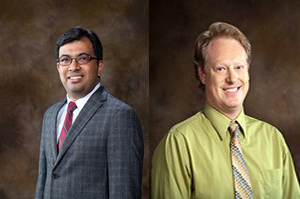FAYETTEVILLE, Ark. – Biomedical engineering professors at the University of Arkansas have received a three-year, $395,722 grant from the National Science Foundation to study how brain cells respond to traumatic injury.
Assistant professors Jeffrey Wolchok and Kartik Balachandran and their team are trying to determine if neuron-supporting cells known as astrocytes create a degenerative extracellular environment after traumatic injuries. The researchers developed a bioreactor – essentially a bench-top crash tester – that can mimic the physical impact that causes brain injuries.
“Similar in concept to the full-scale crash-test systems used by the automotive industry, the bench-top system will be used to apply impact conditions to populations of brain cells grown in the lab,” Wolchok said.
Traumatic brain injuries affect 1.7 million Americans every year. Such injuries include cognitive, behavioral and emotional complications that may be permanent because the injuries alter the behavior of affected brain cells.
The researchers will collect molecules released from the impacted cell cultures to test whether the degenerative traits produced by the astrocytes occur due to the mechanical stimuli. Molecules exuded from the cells include soluble compounds, such as growth factors and cytokines, and insoluble compounds, such as extracellular matrix.
The research will help define the cellular mechanisms that lead to preservation of neuronal cells after traumatic brain injury and will help develop therapies for those affected by traumatic brain injury. The research will also advance the understanding of how astrocytes regulate brain extracellular matrix.
“An improved understanding of the relationship between impact stimuli and the production of soluble and insoluble molecules will help clarify the role astrocytes play in the degeneration processes that follow traumatic brain injury,” Balachandran said.
The study diversifies existing research in the university’s new Department of Biomedical Engineering and expands its educational outreach. The research will be integrated into projects for both undergraduate and K-12 students. The funding will help create a biomedical engineering camp for high school students, support bioreactor design projects and bring in more underrepresented undergraduate students.
Wolchok is the primary investigator in the Regenerative Biomaterials Laboratory at the University of Arkansas. He studies biomaterials derived from cells, tissue engineering and regenerative medicine and bioreactors. He also investigates the design of medical devices and the influence of mechanical force on cell behavior.
Balachadran is the primary investigator in the Mechanobiology and Soft Materials Laboratory. He investigates the role of mechanical forces on physiology, function and disease. Specifically, he studies interactions between structure and mechanics, and tissue engineering techniques that can be used for medical interventions and regenerative therapies.
Topics
Contacts
Jeffrey Wolchok, assistant professor, Department of Biomedical Engineering
College of Engineering
479-575-2850, jwolchok@uark.edu
Kartik Balachandran, assistant professor, Department of Biomedical Engineering
College of Engineering
479-575-3376, kbalacha@uark.edu
Matt McGowan, science and research communications officer
University Relations
479-575-4246,
dmcgowa@uark.edu
